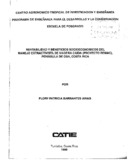Rentabilidad y beneficios socioeconómicos del Manejo Extractivista de Madera Caída (Proyecto REMAC), Península de Osa, Costa Rica
Description
Tesis (Mag. Sc.)--CATIE, Turrialba (Costa Rica) 1999 5 gráfico. 31 tablas. 2 mapas. Referencias de las páginas 106-109
Abstract
El proyecto REMAC trata de aprovechar la madera de los árboles que caen en forma natural dentro de las áreas boscosas. Algunos vecinos del área de Río Piro de Puerto Jiménez han trabajado en la extracción de madera caída desde 1992. Ellos desarrollaron una metodología de manejo y aprovechamiento forestal que les ha permitido comercializar la madera de árboles caídos y obtener beneficios económicos. El presente estudio se compone de seis análisis: 1. Un estudio de tiempos y movimientos para evaluar el rendimiento de las actividades de aprovechamiento y su respectivo costo. 2. Un análisis financiero para el período de años comprendido entre 1996 y junio de 1999. 3. Un análisis financiero por niveles para determinar la rentabilidad del proyecto en tres etapas: Aprovechamiento. Aprovechamiento y manejo. Administración de proyecto. 4. Análisis de sensibilidad cambiando los costos de producción, precios de venta de los productos y volumen comercializado. 5. Una encuesta a los compradores de madera. 6. Una evaluación de las actividades productivas que realizan de las familias que viven las zonas donde se desarrolló el proyecto. En general se determinó que el proyecto REMAC presenta deficiencias de carácter administrativo que han afectado su rentabilidad. Durante el período analizado se observó que las irregularidades en el precio de la madera sumado al deficiente control sobre los gastos han sido los principales problemas que han influido sobre el rendimiento financiero del proyecto. A pesar de lo anterior, también se comprobó mediante el análisis de sensibilidad que la actividad de extracción de madera caída es rentable bajo condiciones administrativas y de mercado normales. Este proyecto ha generado empleo y beneficios económicos a las familias que trabajan en él. Alrededor del 52 por ciento del ingreso de las familias que poseen tierra proviene de la actividad forestal, para aquellos que trabajan en el proyecto pero que no poseen tierra, la actividad forestal representa el 88 por ciento de sus ingresos. Se determinó que la certificación forestal de la madera no es un motivo para adquirir este producto. Los compradores de REMAC apoyan con su compra las iniciativas de conservación del bosque. Este producto es importante para ellos porque proviene de madera caída. Para ellos la certificación forestal es solo una garantía más de la sostenibilidad de este sistema de manejo. Este sistema de manejo, por sus características: uso de motosierra con marco, utilización de animales de tracción y una metodología de manejo y aprovechamiento sencilla, puede ser replicado en otras áreas donde existan las condiciones siguientes: los propietarios de bosque deben estar interesados en realizar el manejo y extracción de madera caída en sus fincas, las condiciones biofísicas de la zona y de la masa forestal son adecuadas para tal propósito, existe interés y disponibilidad de trabajo conjunto entre los vecinos y hay un mercado donde colocar el producto. The REMAC project attempts to extract natural fallen trees in the forest areas. Some members of the Río Piro community of Puerto Jiménez have been working whit the fallen wood extraction since 1992. They have developed a methodology of management and forest use that it has allowed them to market the wood of fallen trees and obtain economical profits from the activity. The evaluation of REMAC project is composed of six analyses: 1. A time and motion study to evaluate the efficiency of the forest exploitation activities and their respective costs. 2. A financial analysis for the period of years from 1996 to June of 1999. 3. A financial analysis at the different levels of management to determine the income yield capacity of the project in three stages: Forest exploitation. Forest exploitation and management. Administration of project, forest exploitation and management. 4. Sensitivity analysis changing the costs of production, price of sale of the products and marketed volume. 5. A survey of the wood purchasers. 6. A social evaluation of the families that live in the zone of Río Piro. In general it was determined that the REMAC project presents deficiencies of an administrative character that have affected their profitability. During the analyzed period it was observed that the irregularities in the prices charged for he wood added to an inadequate control of expenses have been the principal problems that have influenced the financial viability of the project. In spite of the anterior, the analysis of sensibility showed that the activity of extraction of wooden fall is profitable under improved administrative conditions and of normal market. This project has generated employment and economical benefits for the families that work in it. Approximately 52 percent of the income of the families that own land comes from the forest activity, for those that work in the project but that they don't own land, the forest activity represents 88 percent of their income. It was determined that the certification of the wood is not a motive for purchasing this product. The buyers of REMAC support with their purchase the initiatives of forest conservation. This product is important for them because comes from fallen wood. For them the forest certification is only an additional of the sustainability of this management system. This system of handling, due to its characteristics: use of chainsaws with frames, utilization of animal traction and a simple methodology for harvesting and handling could be replicated in other areas where the following conditions exist: the forest owners should be interested in carrying out the handling and extraction fallen wood in their properties, the biophysical conditions of the zone and of the forest mass are adequate for this purpose, there exists interest and readiness to engage in collaborative work in the community and there is a market for the product.
Keywords
Asesor
Current, Dean
Publisher
CATIE, Turriaba (Costa Rica)
URI (Permanet link to cite or share this item)
https://repositorio.catie.ac.cr/handle/11554/9938Collections
- Tesis [3115]


